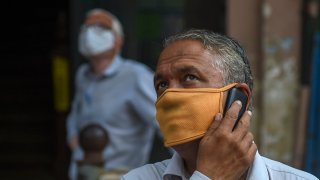
- Surging inflation will continue to be a significant pain-point for India's economy as the country grapples with a third wave of Covid-19 infections., according to an economist.
- Inflation has been a concern for India for over three years now, said Charu Chanana, lead economist, Asia at Continuum Economics, an independent research firm.
Surging inflation will continue to be a significant "pain-point" for India's economy as the country battles a third wave of Covid-19 infections, according to one economist.
Rising prices have been a concern for India for over three years now, said Charu Chanana, lead economist for Asia at Continuum Economics, an independent research firm.
In the first quarter, "we actually do see inflation getting above the 6% level — which is at the upper limit of the RBI central bank," she told CNBC's "Squawk Box Asia" on Tuesday, referring to the Reserve Bank of India.
Feeling out of the loop? We'll catch you up on the Chicago news you need to know. Sign up for the weekly Chicago Catch-Up newsletter here.
"The omicron wave suggests further challenges. In all of the previous Covid-19 waves, we've seen significant supply chain impacts. And the impact on inflation has been significant," she pointed out. It is going to be one of the "most important pain-points for the economy right now," she added.
In the central bank's latest Financial Stability Report released last week, RBI governor Shaktikanta Das underscored that the Indian economy faces headwinds from global developments and more recently, the emergence of the highly transmissible omicron variant.
Money Report
"Inflation remains a concern buffeted as it is by the build-up of cost-push pressures," he said.
The report further noted that even before omicron, global growth and trade were starting to lose steam, stalled by factors such as supply chain disruptions and bottlenecks.
"These forces, along with elevated commodity prices, have rendered inflationary pressures persistent across geographies, posing a serious risk to global economic prospects," the central bank said.
Rising Covid in India
India's Covid-19 cases are rising again as several states such as Delhi and Mumbai grapple with a growing number of infections attributed to the omicron variant.
But unlike the delta wave, India is better prepared to handle the omicron variant this time around due to rising vaccination rates, said Chanana.
"Vaccinations are much better than where India was at the time of the delta wave. We are looking at vaccinating 15-year-olds, plus we are looking at booster shots — that should help drive through this wave," she added.
The latest government data showed 168,000 new cases over a 24-hour period on Tuesday. Cumulative vaccination levels were at more than 1.53 billion vaccine doses as of Tuesday, the data showed.
So far, nearly 45% of the country's population has been fully vaccinated as of Jan. 9, according to Our World in Data.
Still, vaccination rates are low in India compared with other developed markets, Chanana noted.
"I think one other point of concern here is that the omicron wave we've seen in the U.S. and U.K. – they mostly relied on mRNA vaccines to immunize their populations," she said. "India has so far only relied on local vaccines, and it remains to be seen how effective they do well against the new variant."






